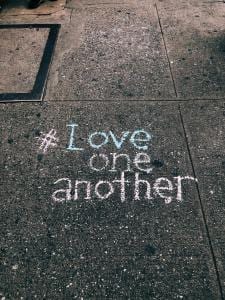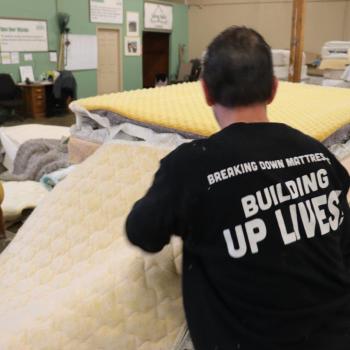David Brooks of the New York Times wrote an interesting article proposing a simple Agenda for Moderates.
He proposes a New Big Idea – one that isn’t so new but freely borrowed from the biblical books of Leviticus and Matthew. “Love Your Neighbor.”
In case you don’t know the reference, Leviticus 19 says this:
“You shall not hate your brother in your heart, but you shall reason frankly with your neighbor, lest you incur sin because of him. You shall not take vengeance or bear a grudge against the sons of your own people, but you shall love your neighbor as yourself.”
And then Matthew 6, the words of Jesus, goes like this:
Jesus replied: “‘Love the Lord your God with all your heart and with all your soul and with all your mind.’ This is the first and greatest commandment. And the second is like it: ‘Love your neighbor as yourself.’
Brooks writes, “Today’s left and right are fueled by anger and seek conflict.” He’s right. Nearly every issue is being divided among these lines. I found it funny that the local coroner in my county was running in 2018 as the incumbent. As a Republican, he had won convincingly in the last two elections. But the Democratic swing in this county swept him out of office for a guy with a D after his name.
This is silly.
The job of a coroner isn’t swayed by his party affiliation.
Loving Your Neighbor could moderate extremes, according to Brooks. He also says the principle “counteracts division, fragmentation, alienation….”
Four Shared Affections
Instead, he proposes moderates rally around “solidarity, fraternity, conversation across difference. A moderate agenda should magnify our affections for one another.”
Using, “love your neighbor as a guide”, he says there are four “shared affections” that we could find some commonality.
- We are bound by our love of our children
- We are bound to society by our work
- We are bound by our affection for place
- We are bound for our affection for humanity
I’ve been thinking about those things.

Bound by our Love of our children
This sounds great. We all love children. What can we do to promote this?
For me, love of children means not killing them. And we’ve had an uneasy peace, a moderate truce in abortion policy over the last decade. But suddenly it’s all the rage to talk about abortion right up to the end of pregnancy, even into the fourth trimester outside the womb. Apparently, Infanticide is acceptable.
So maybe this isn’t the best place to start.
Back to the drawing board. What can we agree on with children? They should be safe. They should be allowed to be kids. They should be given every opportunity to succeed even if their neighborhood is terrible or their parents don’t care about them. How does this translate into policy? How much of it is being just decent.
Love Your Neighbor
Bound by our Work
The idea of leisure is very appealing to me until I’m actually doing it. 2 or 3 days is great. 5 days it starts getting uncomfortable. After 7 days I’m crawling out of my skin.
We are born to produce, to create, to contribute. That’s why those who are chronically unemployed either by choice or circumstance are generally not happy people. Our work and our vocation are God-designed so we could function in this creation. “Whistling in the Workshop,” we are at our best when we are part of our society.
We can agree as moderates to help our nation be at full employment. Those who want to work should be helped find their place. Those that don’t want to work should be encouraged through policy and practice to contribute in some way. The Clinton-era “Welfare to Work” initiative wasn’t cruel, it was affirming.
Want to see a man or woman regain their dignity? Give them a job (See my article on Spring Back here)
Love Your Neighbor
Bound by Our Affection for Place
This sounds a little esoteric at first but think about. Our citizenship might be in a nation, but our home is our community, our neighborhood, our street. These are our people – the ones we care about the most. I can feel sorry and give money for people hit by hurricane or fire or flood in other places, but when my neighbors are impacted? That’s when I really spring into action.
Can we do simple things that bring people together? I’m excited for my first meeting of Make America Dinner Again coming up, where people from opposite sides will sit at the same table and share a meal.
Can we clean the trash out of the creek after a long winter? Can we cheer a local high-schooler who is the state champion wrestler? Can we help buy a new fire truck? Can we do these things with being right or left? Of course … and we should.
Love Your Neighbor
Bound for our affection for humanity
Let’s not get into immigration policy. How about starting with the people that are here. I don’t know anyone who is really for deportation. But none of us like identity theft or manipulation of public services. Let’s find a way for those in the country to have some legitimacy without granting full voting rights and access to every benefit.
And even if public policy doesn’t change, we can all find ways to feed the hunger, take care of the needy and protect our most vulnerable. Or how about just being a friend.
Love Your Neighbor
I’m happy that David Brooks is trying to get us to think. I’m sure there will be those who will find things to pick apart in these words. That’s fine.
But if you can come away with just a little more practical understanding of what Loving Your Neighbor might look like, even in your own way, we might just be on a better path.













